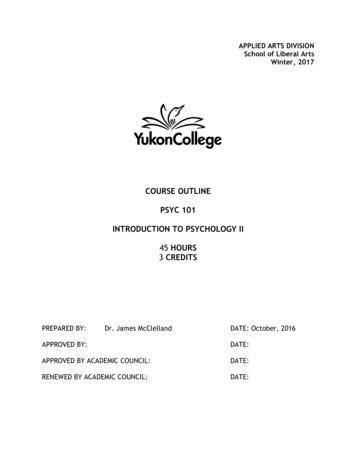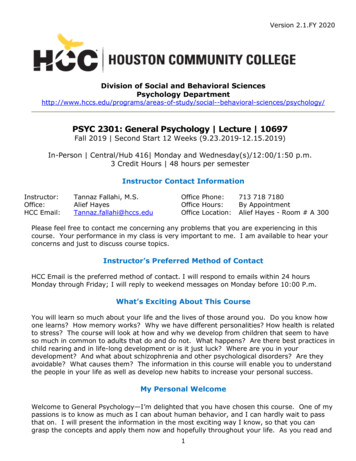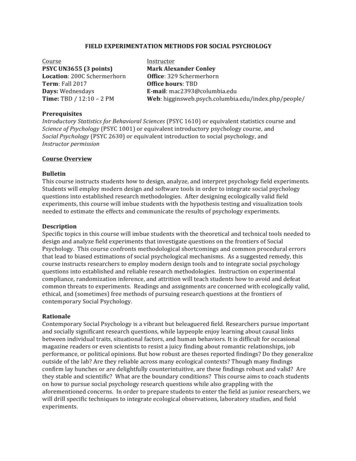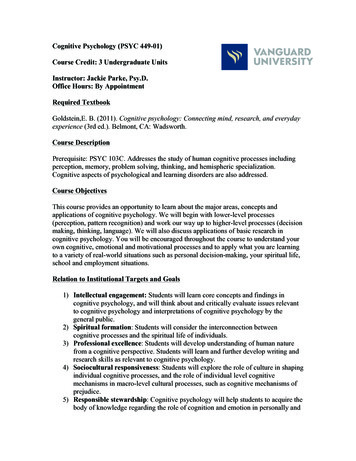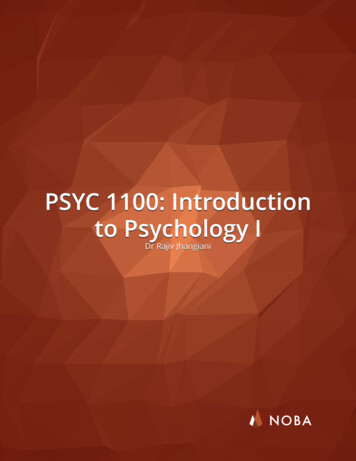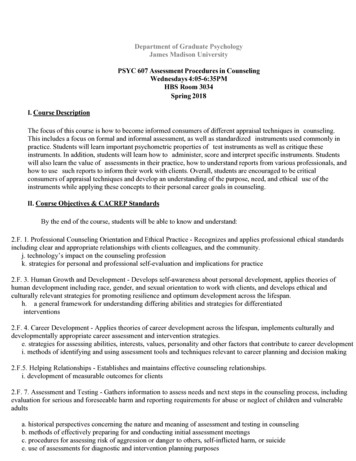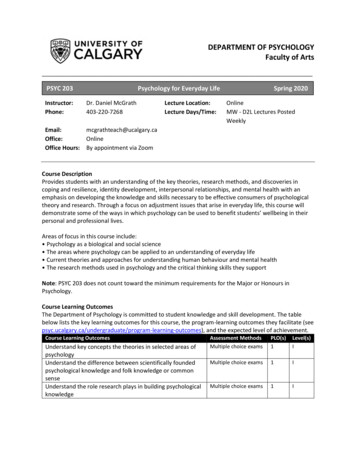
Transcription
DEPARTMENT OF PSYCHOLOGYFaculty of ArtsPSYC 203Instructor:Phone:Psychology for Everyday LifeDr. Daniel McGrath403-220-7268Lecture Location:Lecture Days/Time:Spring 2020OnlineMW - D2L Lectures nlineOffice Hours: By appointment via ZoomCourse DescriptionProvides students with an understanding of the key theories, research methods, and discoveries incoping and resilience, identity development, interpersonal relationships, and mental health with anemphasis on developing the knowledge and skills necessary to be effective consumers of psychologicaltheory and research. Through a focus on adjustment issues that arise in everyday life, this course willdemonstrate some of the ways in which psychology can be used to benefit students’ wellbeing in theirpersonal and professional lives.Areas of focus in this course include: Psychology as a biological and social science The areas where psychology can be applied to an understanding of everyday life Current theories and approaches for understanding human behaviour and mental health The research methods used in psychology and the critical thinking skills they supportNote: PSYC 203 does not count toward the minimum requirements for the Major or Honours inPsychology.Course Learning OutcomesThe Department of Psychology is committed to student knowledge and skill development. The tablebelow lists the key learning outcomes for this course, the program-learning outcomes they facilitate g-outcomes), and the expected level of achievement.Course Learning OutcomesUnderstand key concepts the theories in selected areas ofpsychologyUnderstand the difference between scientifically foundedpsychological knowledge and folk knowledge or commonsenseUnderstand the role research plays in building psychologicalknowledgeAssessment MethodsMultiple choice examsPLO(s)1Level(s)IMultiple choice exams1IMultiple choice exams1I
Understand how to identify scientifically groundedpsychological knowledge claims in the media internet andresearch literaturesAcquire an understanding of the basic vocabularies ofpsychological research methodology and some of the limitsassociated with statements of research resultsAcquire skills needed to locate and interpret psychologicalinformation and apply it appropriately to one’s own oranother’s life situationMultiple choice exams1IMultiple choice exams1IMultiple choice exams1INotes. PLOs Program-Learning Outcomes: 1 demonstrate knowledge of psychological sciences, 2 thinkcritically and solve problems, 3 conduct research and analyze data, 4 communicate effectively, 5 demonstrateinformation literacy, 6 understand and implement ethical principles, 7 apply psychological knowledge andskills. Level of PLO achievement facilitated by this course: I introductory, C competency, A advanced.PrerequisitesThere are no prerequisites to take this courseRequired TextWeiten, W., Dunn, D. S., and Hammer, E. Y. (2017). Psychology Applied to Modern Life: Adjustment inthe 21st Century (12th Ed.), Belmont, CA: Nelson Education Ltd. (available in the university bookstore,online from the bookstore, for rental online, and from other sources such as Amazon).Desire2Learn (D2L) for PSYC 203There is an area on the general campus D2L site set aside for this course. D2L can be accessed via thislink: https://d2l.ucalgary.ca/d2l/homeTHIS SITE SHOULD BE YOUR FIRST STOP FOR QUESTIONS ABOUT COURSE TOPICS, DATES, ETC.Assessment MethodsTwo midterm exams and a final exam (date to be set by the Registrar) are scheduled. All are noncumulative, multiple-choice tests based on textbook and lecture material (including films and otherdemonstrations). Not all test material will be covered in lectures, and some test material covered inlectures will not be covered in the text, so watching all lectures is important for success in this course.Note that you are responsible for all assigned readings from the text even if the specific content has notbeen covered in lectures. The use of class notes or the textbook, computers or calculators is prohibitedduring the tests in this course. It also expected that students will not communicate with each either inperson or electronically during the midterms and final exam.Assessment Methods(1) Midterm Exam #130%
(2) Midterm Exam #2(3) Final Exam (scheduled by the registrar)30%40%(1) Midterm Exam #1 – Monday, May 25th 2020; TIME: 12:00pm – 1:00pm Could include any material covered in class as well as from the assigned textbook chapters 1 hour will be allocated for the midterm Chapters include: 1 (Intro Psychology), 2 (Personality), & 6 (The Self) Comprised of a mix of multiple choice questions You will NOT be allowed to use any of the following during the test: books or notes or electronicresources Worth 30% of the final grade Midterm 1 will be conducted via D2L(2) Midterm Exam #2 - Monday, June 8th 2020; TIME: 12:00pm – 1:00pm Could include any material covered in class as well as from the assigned textbook chapters 1 hour will be allocated for the midterm Chapters include: 3 (Stress), 4 (Coping), & 5 (Health) Comprised of a mix of multiple choice questions You will NOT be allowed to use any of the following during the test: books or notes or electronicresources Worth 30% of the final grade Midterm 2 will be conducted via D2L(3) Final ExamScheduled by the registrar during the winter exam period 2 hours will be allocated for the exam The final exam IS NOT CUMULATIVE Could include any material covered in class as well as from the assigned textbook chapters Chapters include: 7 (Social Thinking), 14 (Disorders), & 15 (Psychotherapy) Comprised of a mix of multiple choice questions You will NOT be allowed to use any of the following during the test: books or notes or electronicresources Worth 40% of the final grade The Final Exam will be conducted via D2L“Test-Taking Advice: Especially for the Multiple-Choice calgary.ca/files/Test Taking Advice.pdfDepartment of Psychology Criteria for Letter GradesPsychology professors use the following criteria when assigning letter grades:
A grade: Exceptional Performance. An A grade indicates near perfect performance on multiple choiceand short answer exams. For research papers/essays/course projects/presentations, an A grade isawarded for exceptional work deserving of special recognition and is therefore not a common grade.A, A- Range: Excellent Performance. Superior understanding of course material. Written work is verystrong in terms of critical and original thinking, content, organization, and the expression of ideas, anddemonstrates student’s thorough knowledge of subject matter.B Range: Good Performance. Above average understanding of course material. Written work showsevidence of critical thinking and attention to organization and editing but could be improved in formand/or content.C Range: Satisfactory Performance. Adequate understanding of course material. Knowledge of basicconcepts and terminology is demonstrated. Written work is satisfactory and meets essentialrequirements but could be improved significantly in form and content. Note: All prerequisites forcourses offered by the Faculty of Arts must be met with a minimum grade of C-.D range: Marginally meets standards. Minimal understanding of subject matter. Written work ismarginally acceptable and meets basic requirements but requires substantial improvements in form andcontent. Student has not mastered course material at a level sufficient for advancement into moresenior courses in the same or related subjects.F grade: Course standards not met. Inadequate understanding of subject matter. Written work does notmeet basic requirements. Student has not demonstrated knowledge of course material at a levelsufficient for course credit.Grading ScaleA AA-96-100%90-95%85-89%B BB-80-84%76-79%72-75%C CC-67-71%63-66%59-62%D DF54-58%50-53%0-49%As stated in the University Calendar, it is at the instructor’s discretion to round off either upward ordownward to determine a final grade when the average of term work and final examinations is betweentwo letter grades. To determine final letter grades, final percentage grades will be rounded up or downto the nearest whole percentage (e.g., 89.5% will be rounded up to 90% A but 89.4% will be roundeddown to 89% A-).Tentative Lecture ScheduleDateW May 6Topic/Activity/Readings/Due Date (revise and add columns & rows as necessary)Spring term lectures beginOverview of the course – Dr. McGrath Introduction Video
M May 11T May 12W May 13M May 18W May 20M May 25W May 27M Jun 1W Jun 3M Jun 8W Jun 10M Jun 15W Jun 17F Jun 19T Jun 23Chapter 1. Introduction to Psychology/Modern Life - VideoLast day to drop classes without penalty and last day to add or swap classes.Chapter 2. Personality - VideoVictoria Day UNIVERSITY CLOSEDChapter 6. The SelfMIDTERM 1 (Chapters 1, 2, & 6); TIME: 12:00pm – 1:00pmChapter 3. Stress - VideoChapter 4. CopingChapter 5. Psychology and Physical HealthChapter 7. Social ThinkingMIDTERM 2 (Chapters 3, 4, & 5) TIME: 12:00pm – 1:00pmChapter 7. Social Thinking ContinuedChapter 14. Psychological DisordersChapter 15. PsychotherapyEnd of Spring Lectures and last day to withdraw from a course.Start of Spring Final ExamsFINAL EXAM (Chapters 7, 14, & 15) To be scheduled by registrarEnd of Spring Final ExamsExtra Research Participation Course Credit is Not Offered for this Course.Absence From A Test/ExamMakeup tests/exams are NOT an option without the approval of the instructor. A student may be askedto provide supporting documentation for an exemption/special request for a make-up m-1.html . Students who miss a test/exam have upto 24 hours to contact the instructor to ask for a makeup test/exam. It’s the instructor’s discretion ifthey will allow a make-up exam. Students who do not schedule a makeup test/exam with the instructorwithin this 24-hour period forfeit the right to a makeup test/exam. At the instructor’s discretion, amakeup test/exam may differ significantly (in form and/or content) from a regularly scheduledtest/exam. Once approved by the instructor a makeup test/exam must be written within 1 week of themissed test/exam during exam make-up hours provided by the ate/exam-and-course-information#mues. If a student cannotwrite their final exam on the date assigned by the Registrar’s Office, they need to apply for a deferredexam xams.Travel During ExamsConsistent with University regulations, students are expected to be available to write scheduled examsat any time during the official June and August examination periods. Requests to write a make-up exambecause of conflicting travel plans (e.g., flight bookings) will NOT be considered by the department.Students are advised to wait until the final examination schedule is posted before making any travelarrangements. If a student cannot write their final exam on the date assigned by the Registrar’s Office,
they need to apply for a deferred exam xams.Students with an exceptional extenuating circumstance (e.g., a family emergency) should contact theDepartment of Psychology (psyugrd@ucalgary.ca).Reappraisal of Graded Term Work tmlReappraisal of Final Grade tmlAcademic AccommodationsStudents seeking an accommodation based on disability or medical concerns should contact StudentAccessibility Services; SAS will process the request and issue letters of accommodation to instructors.For additional information on support services and accommodations for students with disabilities, visitwww.ucalgary.ca/access/. Students who require an accommodation in relation to their courseworkbased on a protected ground other than disability should communicate this need in writing to theirInstructor. The full policy on Student Accommodations is available tudent-accommodation-policy.pdf.Academic MisconductFor information on academic misconduct and its consequences, please see the University of CalgaryCalendar at lInstructor Intellectual PropertyCourse materials created by professor(s) (including course outlines, presentations and posted notes,labs, case studies, assignments and exams) remain the intellectual property of the professor(s). Thesematerials may NOT be reproduced, redistributed or copied without the explicit consent of the professor.The posting of course materials to third party websites such as note-sharing sites without permission isprohibited. Sharing of extracts of these course materials with other students enrolled in the course atthe same time may be allowed under fair dealing.Copyright LegislationAll students are required to read the University of Calgary policy on Acceptable Use of MaterialProtected by Copyright e-use-of-material-protectedby-copyright.pdf) and requirements of the copyright act x.html) to ensure they are aware of the consequences of unauthorized sharing of coursematerials (including instructor notes, electronic versions of textbooks etc.). Students who use materialprotected by copyright in violation of this policy may be disciplined under the Non-AcademicMisconduct Policy.
Freedom OF Information and Protection of PrivacyStudent information will be collected in accordance with typical (or usual) classroom practice. Students’assignments will be accessible only by the authorized course faculty. Private information related to theindividual student is treated with the utmost regard by the faculty at the University of CalgaryStudent Support and ation/course-outlinesAcknowledgments and Respect for DiversityOur classrooms view diversity of identity as a strength and resource. Your experiences and differentperspectives are encouraged and add to a rich learning environment that fosters critical thoughtthrough respectful discussion and inclusion. The Department of Psychology would also like toacknowledge the traditional territories of the people of the Treaty 7 region in southern Alberta. The Cityof Calgary is also home to Métis Nation of Alberta, Region III.Important DatesThe last day to drop this course with no “W” notation and still receive a tuition fee refund is Tuesday,May 12, 2020. Last day for registration/change of registration is Tuesday, May 12, 2020. The last day towithdraw from this course is Monday, June 17, 2020.
Psychology Applied to Modern Life: Adjustment in the 21st Century (12th Ed.), Belmont, CA: Nelson Education Ltd. (available in the university bookstore, online from the bookstore, for rental online, and from other sources such as Amazon). Desire2Learn (D2L) for PSYC 203 There is an area
